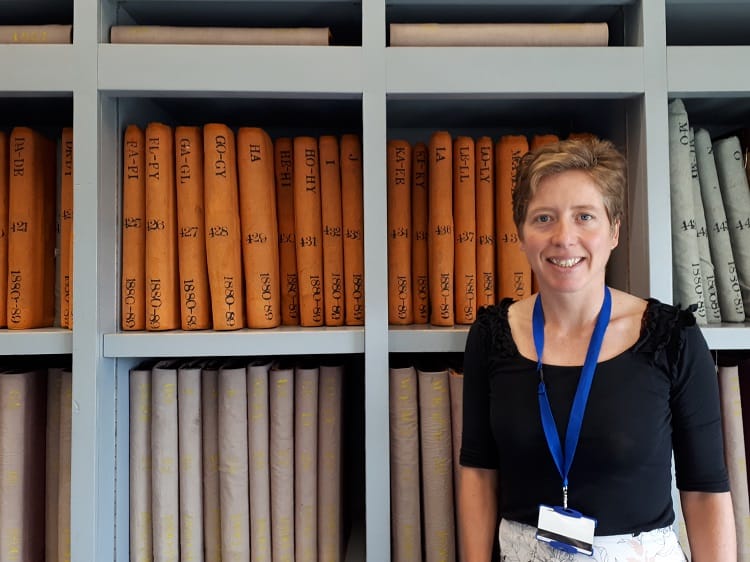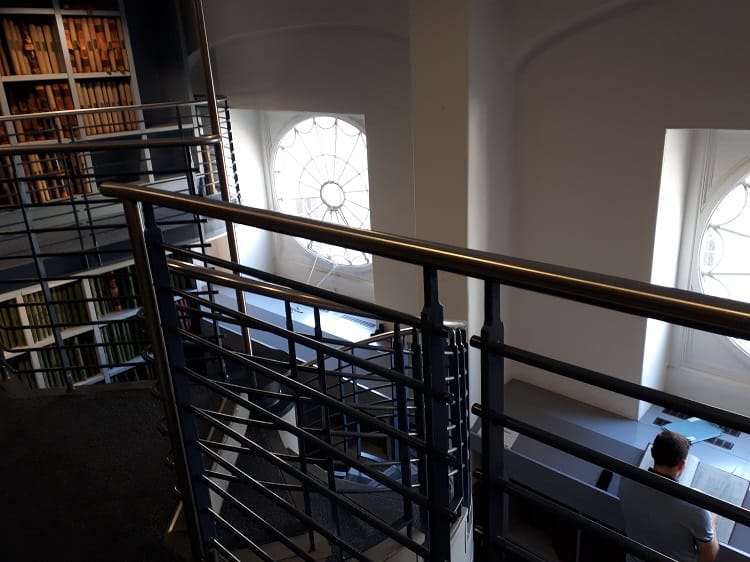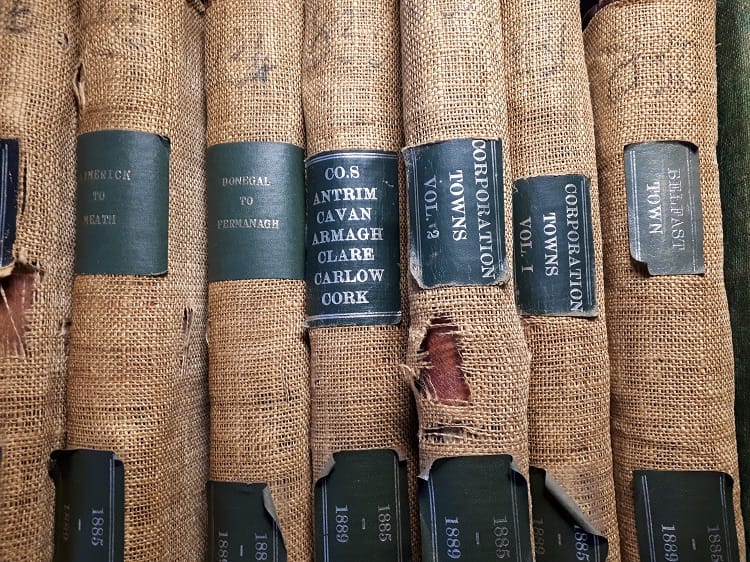What’s the best way to tell area residents about plans for a new asylum shelter nearby?
The government should tell communities directly about plans for new asylum shelters, some activists and politicians say.
“There is no other record in the country like it. I think that is a real treasure trove,” says Ellen Murphy.

On top of a wooden cabinet in her office, Ellen Murphy has spread out an old parchment with lacey writing and a blob of red wax in the bottom right corner.
It’s an example of the kinds of records held here – a copy of a “memorial” from July 1782. It relates to a sale of a “large house”, says Murphy, the new archivist at the Registry of Deeds. Some might know it.
In 1782, it was Newtown Lodge and grounds, sold by Robert Clements to representatives of King George III for a handsome £25,000, the document shows. In 1938, Douglas Hyde moved in. Today, it’s known as Áras an Uachtaráin, she says.
Historians, solicitors, those seeking clues about their roots, and more contemporary detectives looking for owners of vacant buildings sometimes find themselves in the Registry of Deeds, in the grand King’s Inns building near Constitution Hill.
For the first time, the registry now has an archivist to try to make that easier – with a focus on the historical records, Murphy says.
The first task is to build awareness about the collection and how historically important it is to the country, she said, last Friday. “To start encouraging people to use the material” and “to think how best can we improve access to the collection”.
That might mean “physically in the building here, or wherever it is through exhibitions or longer-term with digitisation”, she says.
Many of the records here in the Registry of Deeds are the only ones of their type, says Murphy, sat behind her desk on the ground floor.
Piles of records from the 18th and 19th centuries were destroyed in 1922, during the Civil War, in a fire in the Four Courts.
But the Registry of Deeds holds a complete set of what are known as memorials from 1708 to the present day. “The fact that we have 200 years extra is really important,” she says.
When people had a deed that related to a land sale, they could bring it to the the Registry of Deeds, where a transcript was made and then kept there. If there was a dispute over land, the most recent memorial would get precedence over past memorials.
The registry was set up in 1708. “At that time, there was the penal laws and there was a lot of land transfer between Catholic land was taken over by Protestants. This was a way of legalising it,” says Murphy.
“Some people think that these records only relate to Protestants and there’s not Catholic information in it,” she says. “But there absolutely is.”
There’s lots of individual cases within the collections where land is transferred to a Protestant member of the family, and then in 50 years time or 75 years time when the laws are relaxed, they’re transferred back, she says.
“There is huge potential for family history,” she says. Some wills and marriage certificates were also registered there, when they led to transactions around property.
“One of the real strengths of the records are that early period from 1708 to the 1830s,” she says. “There is no other record in the country like it. I think that is a real treasure trove.”
Murphy used to work at the Dublin City Archives. Before that, she studied history – a BA thesis on governesses in Ireland, and an MA on the fate of single women in old age in 19th-century Ireland.
“So, not particularly related to land transactions,” she says. “But really interested in social aspects of Irish history.” Some of the records here hold clues to that.

### The Search
In the 29 years she has worked at the registry, Emily Moore has had many offbeat queries. “Who owns the side of a mountain?” she says, was one. That was all about grazing rights.
People are always asking for maps, says Glen Fanning, who also works there. It’s usually neighbours sparring over a fence or boundary that might have inched a ways over the years. “Every single day,” he says. “We don’t have those here though.”
Moore says she advises those looking to search in the historical records to start with what is known as the Townland Index – the old ledgers of streets from 1708 to 1946 for most places, with the sellers and buyers listed below, kept in a room with a spiral staircase.
People can search in this index, and the Names Index if they know the name and period they are looking for, to track down a reference number that leads to a transcript with all of the details of who bought and who sold, and for how much. From 1970, the Names Index is digitised.
“It can also be frustrating if you can’t find anything on it,” says Moore, as she looks through the pages of a book propped open on an alcove.
“The house beside of the Harp and Crown”, reads one description. “Part of a triangular piece of ground”, reads another.
Some pages have more listed than others. The Townland Index offers insight into how a particular area was being developed, says Murphy. “Was it one landlord who had a whole townland or local area? Or was there lots of little smaller pieces relating to it?”
There were a huge number of transactions during the Famine, she said. “That is definitely worth more research.”
A spokesperson for the Property Registration Authority (PRA), which manages both the Registry of Deeds and its sister, the Land Registry, said hiring an archives manager was the first step in better preserving and managing these archives.
The PRA hopes to make the case to government “for funds to digitise these records over time and make them publicly available online, at which point they will be fully accessible and searchable”, they said.

The transcripts room at the Registry of Deeds is where copies of the memorials, with all the details in them, are kept in big books on shelves, like wheels of cheese in a storehouse.
“They’re called tombstones,” says Moore.
She lugs a giant heavy book from one shelf, and then another – this one the first book of transcripts. “The writing is glorious. Very hard to decipher,” she says. It takes a few readings to adjust.
“I actually love this,” she says, pointing at the title page. It was in the time of Queen Anne that the records began, it says.
“You always hear of King George and that, but it’s very rare that you hear about Queen Anne,” she says.
Not all land is registered. To date, 77 percent of the land mass in “Dublin county and city” has been registered, according to the PRA. But just 51 percent is in Dublin city.
Since 2011, any new sales of property have had to be registered with the Land Registry. For recent sales, though, there is a backlog. Many, therefore, don’t yet appear on the online maps at Landdirect.ie.
Each year, the PRA gets more than 210,000 transactions to register, said a spokesperson. If it’s the first time land or property is registered, the documentation can be poor, which can lead to rejections or delays for those.
The PRA has a project to speed up these cases, which will include recruiting more “legal resources and business process improvements”, they said.
The delays at the Land Registry mean some still people log first-time registrations with the old Registry of Deeds “to ensure priority”, said the spokesperson.
Those seeking records from the 1970s, can find themselves walking through a big yellow door in the public search room, where Fanning, Moore and others talk them through their search and what is and isn’t possible.

Just like in old ledgers, the search has to start with the seller’s name, says Moore. You can’t start with an inkling of who might have bought a property, or an address alone.
That’s because of the Registration of Deeds and Title Act 2006, which means it is only searchable by seller, said a spokesperson for the PRA. “This is a matter that the PRA are keeping under review.”
Get our latest headlines in one of them, and recommendations for things to do in Dublin in the other.